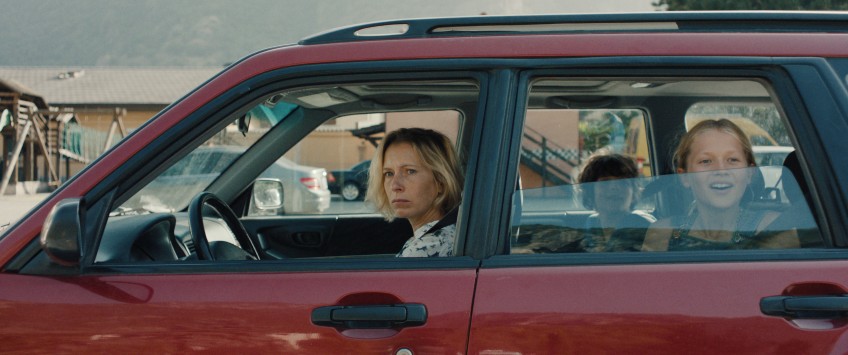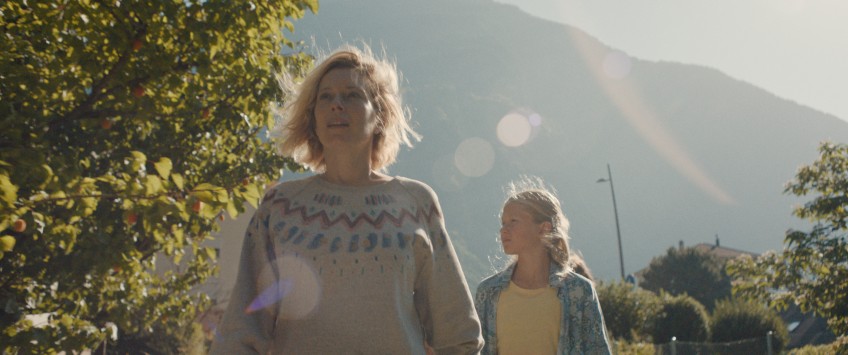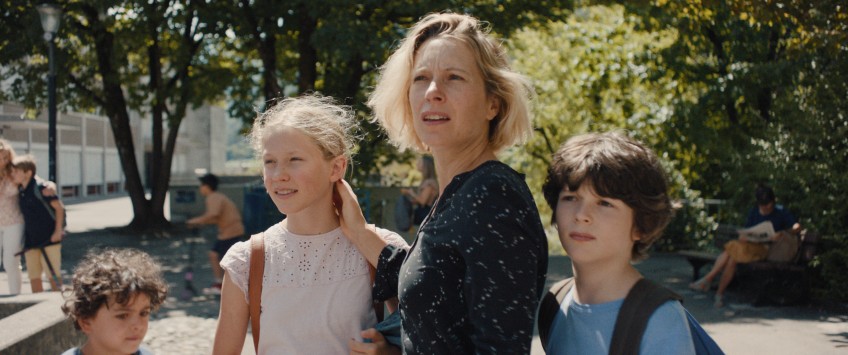Joyce Glasser reviews The Courageous (September 5, 2025) cert 12A, 85 mins.
In her theatrical debut as writer-director, Swiss-American Jasmin Gordin delivers a very watchable, if often painfully so, family drama set in Switzerland’s majestic, though slightly downmarket, lower Valais region. Here, 40-year-old, single mother of three Jule (Call My Agent! star Ophélia Kolb) struggles on the margins of society, and of morality, to remain free while finding a home for her three young children.
When we first meet Jule she is driving her children, Claire (10), Loïc (8), who is unofficially diagnosed with Aspergers, and Sami (6) somewhere, but we do not know her destination. She stops at a roadside coffeeshop and orders one lemonade, telling the children, ‘I’ll be right back.’

Awkwardly and nervously, the children wait, under the suspicious gaze of the waitress who eventually asks the children if they have been abandoned. Despite their adamant negation of this suggestion, after several hours the waitress calls the police. The children run, and eventually make it home, exhausted. We get the feeling they’ve been in this situation before.
Jule, frantic with worry, returns to the ramshackle home relieved to find the kids safe and asleep on empty stomachs. She carries them from the sofa to the one bedroom where they all sleep, returning to the sofa to sleep. You might detect tears in her eyes.
We never find out where Jules went. We never learn if the children come from one or more fathers and where the father is. Although Loïc, who is detained for missing too much school, tells the school principal that his mother “deals with numbers for a business,” we never find out what Jule does.
We do learn that they move around a lot. The school principal asks Loïc if his mother was working with numbers when they lived in Nancy a year ago. The boy replies with a rehearsed line: ‘I was very young in Nancy.’
Much later in the film we witness a short interaction when a man in a shopping centre recognises Jule, and we have a hint about why she moves around.
‘I thought we weren’t supposed to see you around here,’ the man shouts over to Jule, his friendly tone belying the spoken words.
‘Well, only fools and dead men don’t change their minds’ Jule flippantly offers, not elaborating on who changed his or her mind. By now we have seen Jule shop lifting and breaking into a safe, so leaving might not have been a voluntary decision.
Whether or not Jule works with numbers, she is smart enough to realise that the rental game is getting her nowhere. She has aspirations beyond her ability, with three children, to realise them. She tells a representative of the Council that she refused a new rental because it would require the children changing schools which is disruptive to their social and educational development.
But she takes them out of school to accompany her on a trip to an empty house that appears to be for sale. There the children share their mother’s fantasy, running around the spacious home, picking which bedroom will be theirs, as Jule lies on the floor making a star with her body.

Jule clearly wants the best for her children and, in her own way, longs to be accepted and to have her kids accepted. When one of the children is invited to a birthday party, Jules drives the child over with a gift. But it’s shop-lifted and unwrapped with no card.
Hanging around while the hostess and another boy’s mother discuss an excursion to the seashore that weekend, Jule pipes in that they are doing that also. And Gordin cuts to Jule and the children frolicking in a beautiful lake where they are the only ones.
The title comes from a booklet Jule finds in the glove compartment of her car that is on empty before she commits theft. ‘Those who are courageous are free’
It’s not clear whether Gordin is condemning society (in one scene, there is a Ken Loach like argument about the difficulty of getting on the housing ladder and the waste that is renting) and holding up Jule as a battered heroine or just sympathising with an unconventional mother who cannot conform to society’s norms.
What is clear is that Gordin gives us a woman who cannot handle the restrictions motherhood imposes on a parent, dreaming of a better life without the discipline to achieve it.
The children are suffering from a life of instability but Claire is just old enough to begin to question her mother’s mental capacity. The last scene demonstrates Jule’s fighting spirit and resilience, but also her deeply troubling desperation.




